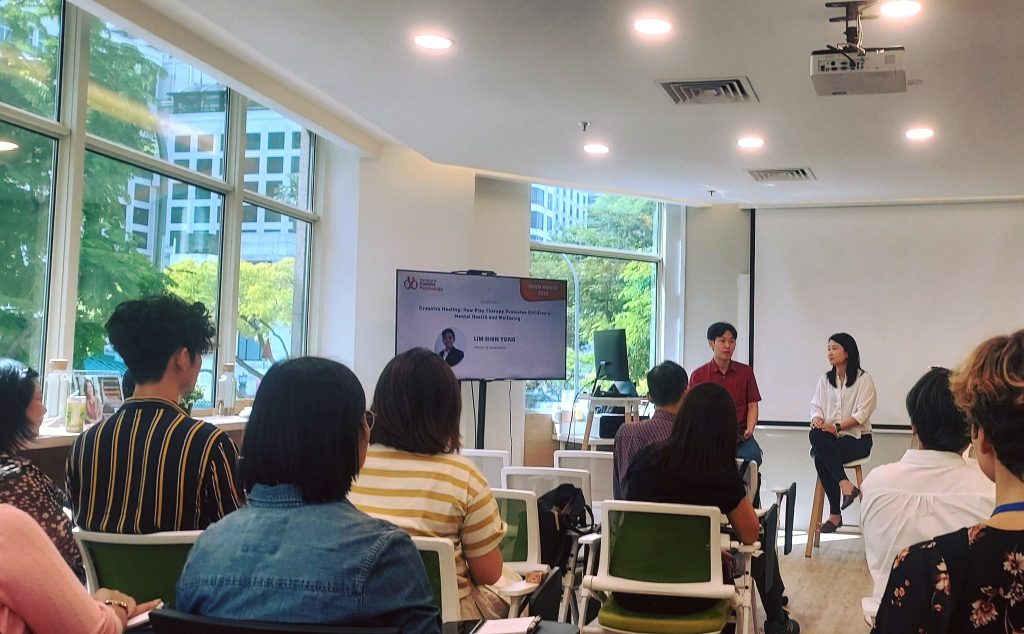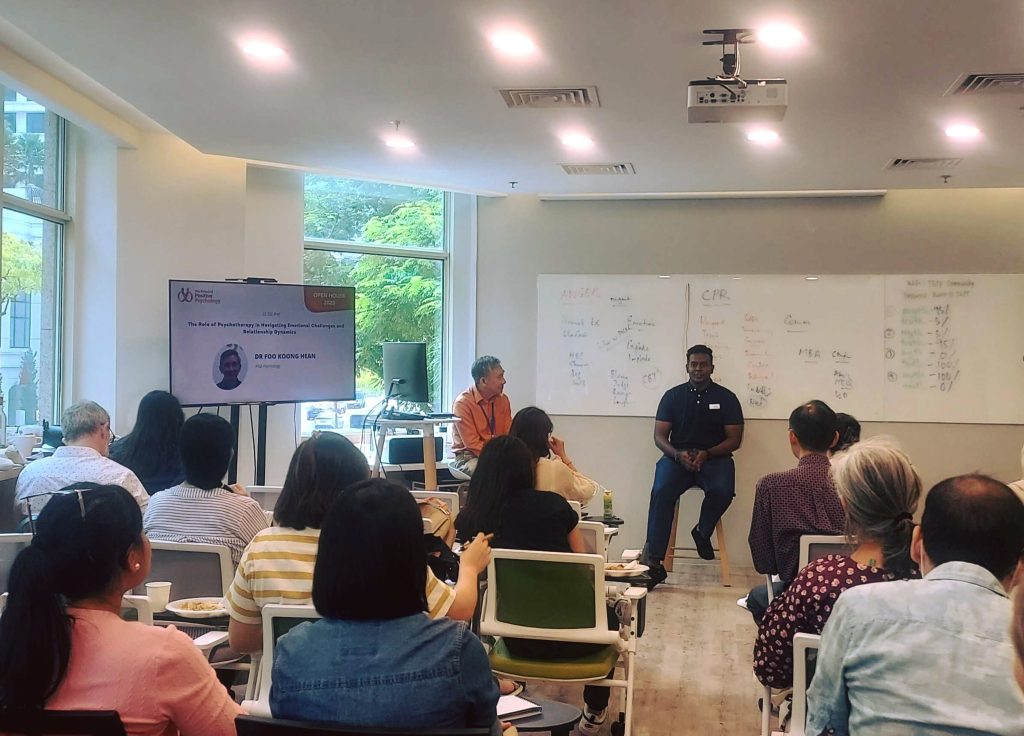You may have decided that it’s time to fulfill your passion in studying psychology. But out of the multitude of pathways that one can take, which is the right one for you?
During our recent Open House, our expert lecturers gave a series of talks, illuminating how insights from child psychology, psychotherapy, positive psychology, and coaching psychology can benefit and transform our lives.
Gain a sneak peak into an education in child psychology, psychotherapy, positive psychology, and coaching psychology as we distill the key takeaways from our Open House talks.

TSPP lecturer Shen Yong dialogues with a TSPP Graduate, Fern (Diploma in Child Psychology, Class of 2022, and Professional Diploma in Child Psychology, Class of 2023) on communicating effectively with a child through play.
How Play Therapy Promotes Children's Mental Health and Wellbeing
Unlike adults who talk about their problems to work through them, children use play as their therapeutic medium.
In play therapy, the focus is not on changing the child but providing a safe space for them to express and experience their emotions. Play therapy serves as a precious outlet, allowing children to communicate and process feelings that they may not express verbally.
“Toys are used like words by children, and play is their language.”
Garry Landreth, author on child centred play therapy Tweet
Whether as a parent or a professional who works with children, learning to observe a child’s play provides valuable cues, as it may communicate emotions or serve as a means of emotional release. It is important to note here that play therapy still operates within established theoretical approaches to guide its effectiveness.
Learning about play therapy and more topics within child psychology equips caregivers with practical tools to foster a supportive and nurturing environment, by guiding the understanding of childrens’ developmental stages, cognitive processes, and emotional needs, ultimately contributing to healthier and more harmonious relationships with the children.
Child psychology can be hugely valuable to anyone who regularly interacts with children, but for those looking to work with adult mental health and wellbeing, two more key branches in psychology will be of particular interest: Psychotherapy, and Positive Psychology.
Unlocking Human Potential with Positive Psychology’s Strengths-based Approach
Human beings are excellent problem solvers. But this also means we are really good at looking at problems and thinking about how we could have done better.
Societal norms and our negativity bias have conditioned us to focus on fixing our weaknesses. Culturally, most people are not even comfortable talking about their strengths because it may seem like boasting.
But focusing exclusively on problems and weaknesses affects our self-talk, our energy, and our self-worth. By adopting a strengths based approach, we are more than just labeling what we’re good at. We are participating in a mindset shift surrounding the way we look at ourselves and the people around us. This shift to a strengths-based approach makes us more resilient, because we then know which part of our characteristics we can harness to get out of a problem.

Open House attendees engaging in a sharing about their strengths during the session “Discovering Human Potential and Purpose with Strengths”.
“Can we shift our weaknesses? Sure. But will we enjoy it? Probably not so much. And it’s unlikely to help us achieve our best selves either.”
Jana Dawson, Speaker and Academic Director Tweet
Adopting a strengths-based approach provides a powerful framework for personal and professional growth, because we start to talk differently about our pathways to success, tapping into what energises rather than drains us.
Building a Culture of Thriving with Coaching Psychology
Another transformative mindset is that from coaching psychology. Coaching is not just about developing coaching skills. It’s about embracing a holistic approach to developing individuals and drawing out their best.
Of course, this mindset shift has a vast potential to benefit many changemakers, not just aspiring life coaches. Coaching skills can enhance the conversations we have with everyone around us. Rather than offer advice, coaching skills equip individuals to pose the right questions and guide others to uncover their own solutions.
“Who likes being told what to do? I definitely don’t. But if I come up with solutions myself, there is ownership to it. I am motivated to do it. If someone gave me sound advice, sure I might take it on, but it doesn’t feel empowering.”
Jana Dawson, Speaker and Academic Director Tweet

TSPP’s Founder, Stephen Lew, was joined by Manjit Kaur (Postgraduate Diploma in Positive Organisational Psychology and Leadership, Class of 2021) and Hiroshi Limmel (Graduate Diploma in Applied Positive Psychology, Class of 2021) to share about their transformative experiences using positive psychology interventions in their organisations.
Through meaningful conversations guided by research and frameworks like self-determination theory, coaches have a profound ability to motivate and guide individuals toward autonomy and belongingness in their life choices.
The best way to see the value that Positive and Coaching Psychology can bring, is to observe how it can apply in every level of organisational development.
Since people are what drive organisations, positive psychology and coaching psychology can set the path to success by equipping employees with tools to communicate more effectively, navigate problems with their strengths, and build deeper relationships and meaning within the teams.
Questions may inevitably arise regarding the resources, manpower, and time needed to see results from wellbeing interventions. While it may initially be challenging to get buy-in, it is important to recognise the groundbreaking research showing clear returns – outcomes which include less absenteeism, employees becoming more engaged, and ultimately increases in productivity.
Now, let’s move on to examine the value of an education in psychotherapy.
Trauma and the Healing Power of Psychotherapy
Trauma stands as a poignant testament to the critical role that psychotherapy education plays in alleviating mental health struggles.
When a person suffers from Post-traumatic Stress Disorder (PTSD) or Complex Post-Traumatic Stress Disorder (CPTSD), they are stuck in a survival-mode which inhibits learning, memory, and personal development. It may be difficult to regulate their emotions or behaviour, which is why professional help is often necessary to step beyond.
A simple working definition of trauma is having an experience that was too much, too soon or too fast, and not having adequate support to process the resulting painful emotions. As a result, in later stages of life, the person may try to cope in many different ways to numb out this pain, through behaviours like alcoholism or other addictions. In fact, psychologists are starting to see that many mental illness diagnoses like anxiety, bipolar, borderline personality disorder and more can be traced back to trauma.
Learning more about trauma helps us to become more compassionate towards people, as we start to see that ‘bad’ behaviours result from adverse experiences they went through during their lives.
With a better understanding of how to identify and support someone going through the damaging legacy of trauma, there is vast potential to improve the lives of many, many people.
“It’s all about first understanding what happened, and having a non-judgemental attitude, and really understanding that these difficult behaviours are survival mechanisms. They are things that helped you survive in your family. As Janina Fisher has so compassionately explained: traumas are in fact red badges of courage that tell a story of what happened.”
Dr Alla Demutska, Speaker and Clinical Director Tweet
Learn to Guide and Empower Others with Psychotherapy
Aside from being able to understand and work with deep issues like trauma, learning psychotherapy gives us invaluable insights into navigating emotional challenges and relationship dynamics.

TSPP Lecturer, Dr. Titus Foo (PhD Psychology), invites TSPP Graduate P. Vishnu (Professional Diploma in Psychotherapy, Class of 2020) for an informative chat on his experiences as a therapist.
By delving into the intricacies of human behaviour, emotions, and the underlying factors shaping them, we develop a profound self-awareness that enhances our ability to manage our own emotions, and guide others in regulating theirs as well.
Psychotherapy trainees may find that they become more and more able to empathise with others, and also able to use effective communication strategies, active listening techniques, and intervention methods to empower others with sensitivity and insight.
Conclusion
While all branches of applied psychology are equally powerful in transforming the way we perceive and interact with people, expanding our ability to influence and help them to change, each branch works with a different approach and target group.
Child psychology helps us to nurture emotionally healthy children. Psychotherapy focuses on helping those who are struggling with their mental health, asking the question: “What’s wrong?” and using various psychotherapy modalities to support them towards becoming mentally healthy.
Positive Psychology and Coaching approaches those who may not feel that something is necessarily wrong, but may feel a desire to progress further and are not sure how. With coaching tools and positive psychology interventions, practitioners can support others towards flourishing,
While courses at The School of Positive Psychology are guaranteed to impart valuable skills and knowledge, they each target different contexts and audiences, and it is important to understand what each sub-discipline is about.
However, what is clear is the huge potential that an education in psychology can bring to improve the many facets of our lives, whether as a professional, a parent, a caregiver, or a friend.
Want to have a glimpse into the TSPP Open House experience? See the on-campus action with our Open House event highlights video here!
View Our Courses
- Graduate Diploma in Coaching Psychology
- Diploma in Child Psychology and Intervention
- Graduate Diploma in Psychotherapy and Counselling
- Postgraduate Diploma in Psychotherapy and Counselling
- Graduate Diploma in Applied Positive Psychology
- Postgraduate Diploma in Positive Organisational Psychology and Leadership


